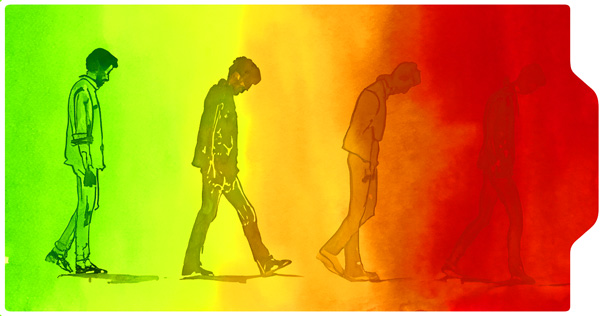For as long as humankind has been telling stories to each other, they've been using those stories as a method to teach. From the morals of Aesop's Fables to the lessons about tolerance taught by Star Trek, fiction has been used to teach and educate those who listen. While the lessons of works from the past have been fairly well-explained, there is a lot of recent material with valuable lessons to teach the current generation. In a series of articles we're calling Required Viewing, we'll explore various works with a lesson we feel will help guide the next generation of men achieve their full potential.
Required Viewing, Episode 1
Fight Club.
Frequently hailed as one of the quintessential “guy movies,” 1999's Fight Club is in a unique class of films that actually get better with repeated viewings. The film contains so much complexity and symbolism it's reached a point where some film schools refuse to accept any new essays written about it. The movie also frequently peppered with clues to its famous twist ending, makes it necessary to watch again to see what you can pick up the second time around.
However, underneath the blood, sweat, and snark are a few important messages that help make Fight Club a valuable lesson to modern men and required viewing for the next generation.
Lesson 1: You are not special.
This is easily one of the movie's most famous, most controversial, and most quoted lines:
Tyler Durden: Listen up, maggots. You are not special. You are not a beautiful or unique snowflake. You're the same decaying organic matter as everything else.
Harsh? Sure. A valuable lesson to learn? Absolutely.
Men of the “self-esteem generation” are approaching their adulthood with one major factor against them. Growing up in a time when people don't keep score and everyone was given participation trophies may have improved their self-image, but it has crippled their ability to compete in the real world.
Whether we'd like to admit it or not, life boils down to competition. It's called a job hunt for a reason. As much as your parents and teachers might have said you were a special child, in the real world, you are one resume in a stack of dozens, all vying for one single position. However, rather than trying to topple the system like in the movie, this should instead be a call to action. One overlooked upside to getting knocked down is that it usually encourages people to either re-prioritize (for example, if you got fired from a job you're terrible at, reevaluate and start looking for something that's a better fit) or better yet, improve.
The occasional failure is supposed to light a fire under you to improve yourself to avoid failing again. Get fired from your job? Then improve your skill set to become the best candidate for the next one. Get dumped by your girlfriend? Then make her regret it by becoming the best damn man you can be.
(And yes, I am aware that Tyler Durden had his own pointed comment regarding self-improvement; however, realize that his suggestion of self-destruction was still improving, albeit in a knock-it-down-and-start-over way.)
Lesson 2: Find the balance.
Fight Club is also important as a lesson of extremes, both of them terrible. By the end, it's obvious that Tyler Durden's approach to things is a colossally bad idea (even if the name “Project Mayhem” didn't tip you off.) However, the movie goes out of its way to highlight that the Narrator's life at the beginning was just as bad. He started out the movie in a state that can only be described as “waking death.” The Narrator leads such a boring life of drudgery he's developed severe insomnia, saying that:
“When you have insomnia, you're never really asleep… and you're never really awake.”
The narrator is saying he hasn't actually lived enough to need to go back to sleep. He merely moved from home to work and back again, never breaking up the monotony of his day.
Tyler explicitly claims a loss of masculinity to blame, hence the reason he starts Fight Club to begin with: As a means of getting back to our primal instincts and getting masculinity back. With new studies showing that men's testosterone levels have been declining for decades, Tyler (at least the version of Tyler in the early part of the movie before he went screaming off the deep end) had a point. There is a definite middle ground where most men should be between the Narrator's neutered excuse for a life and Tyler's neo-primitive anarchy, and it's up to you to find the balance.
There is a definite middle ground where most men should be between the Narrator’s neutered excuse for a life and Tyler’s neo-primitive anarchy, and it’s up to you to find the balance.
Lesson 3: Stop keeping up with the Joneses.
Another lesson of Fight Club that can be summarized as “Tyler has a point, but takes it way too far,” is this quote:
Tyler Durden: The things you own end up owning you.
That line, as it was originally intended, was a criticism of commercialism and how we're convinced by society that we're not complete without “things,” as illustrated by our pathetic sad-sack Narrator having an item-for-item replica of a furniture catalog in his living room and still feeling hollow inside. Considering how frequently we circulate around the quote “We waste our lives spending money we don't have on things we don't need to impress people we don't like,” it seems that a lot of people agree on some level with that version of the message. However, that line has also taken a whole new meaning in recent years.
A rise in technology has also led to an entire new group of problems affecting us. Everything from “smartphone addiction” (where people are unable to carry on a normal conversation without checking their phone multiple times) to “Facebook depression” (where people become depressed comparing their lives to those of Facebook friends) have sprung up. To get to the point, the things we own have started to own us. It's important to occasionally cut the digital leash and go unplugged for a weekend or so to get all the extra noise out of your head.
When done well, movies and television can teach just as easily as any other medium, and some lessons are so valuable they really should be required viewing. Fight Club is such a complex and intentionally vague film, it has multiple lessons that can be taken from it, certainly more than what's written here. So look it up and learn something.
















